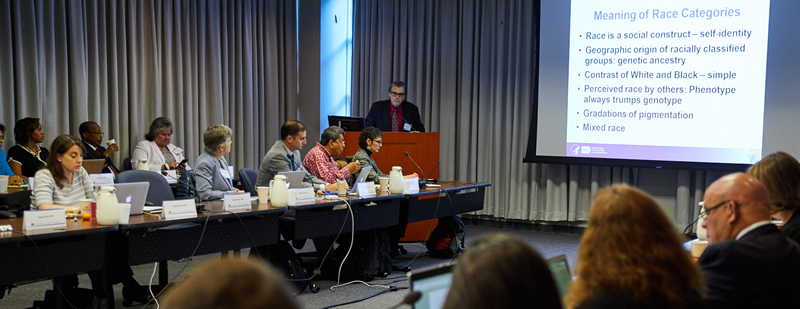Last updated: March 07, 2017
February 7 2017 Workshop On The Use Of Race And Ethnicity In Genomics And Biomedical Research
Workshop on the Use of Race and Ethnicity in Genomics and Biomedical Research
February 7, 2017
The completion of the Human Genome Project and subsequent genomics research over the last ~14 years have reinforced the notion that humans across the globe are more alike than they are different. But we also know that many factors - ancestry, environment, and social factors - have a profound effect on human health. One challenge facing genomics and biomedical research is how best to describe the diversity of the human population as part of research studies.
On October 24 and 25, 2016, NHGRI and the National Institute on Minority Health and Health Disparities (NIMHD) convened a workshop to discuss the use of race and ethnicity data in genomics, biomedical, and clinical research, and the application of such information to the study of minority health and health disparities. A group of genomic, clinical, epidemiological, and social science researchers (as well as NIH staff, government stakeholders, and other experts) came together to discuss how human data about diversity, including race and ethnicity, are studied and reported.

NIMHD Director Dr. Eliseo Pérez-Stable gives opening remarks about the use of race and ethnicity data in minority health and health disparities research.
The workshop's objective was to explore how genomics and biomedical research can describe research participants' diverse backgrounds and experiences in ways that are both scientifically and socially meaningful. Developing ways to advance the understanding of the concepts of self-identified race and ethnicity (SIRE) and ancestry informative markers (AIMs) in biomedical research was a featured component of the workshop's agenda. Recommendations for the appropriate use of race, ethnicity, and other population descriptors in scientific research were sought from the participants.
Workshop attendees discussed how social and political population labels, such as categories for race and ethnicity, are used in the design of genomics and biomedical research projects. However, such labels influence how scientists and the public conceptualize, discuss, and react to human differences. Improper use of population descriptors in biomedical research can spread misinformation and cause stigmatization.
Several critical themes and recommendations emerged from the workshop: (1) Without abandoning the current Office of Management and Budget categories for U.S.-based research, researchers should expand the depth of information collected regarding race and ethnicity in a comprehensive and standardized way; (2) An expansion of the collected data categories beyond race and ethnicity that will help explain population differences should be encouraged (e.g., socioeconomic status, region, zip code, and immigration history); (3) The instructions to researchers about collecting and reporting race and ethnicity data should be examined and, if necessary, revised to ensure they do not limit the ways that population data can be reported; (4) A global approach for describing diverse populations in international research should be developed, as should the means for making such data comparable; (5) Longitudinal frameworks for assessing racial and ethnic identity should be investigated; (6) Standardized approaches for utilizing electronic health care record data in genomic and biomedical research should be established; and (7) Research about the use of race and ethnicity data should be incorporated into existing NIH Program Announcements.

NHGRI Director Dr. Eric Green (left) and NIMHD Director Dr. Eliseo Pérez-Stable (right) at the Workshop on the Use of Race and Ethnicity in Genomics and Biomedical Research.
Conversations and research about these complicated questions are critical for bringing the benefits of genomics to everyone. Next steps from the workshop include publishing a meeting report, investigating the feasibility of funding research on the complexity of race and ethnicity in health research, and formulating official recommendations on the collection and reporting of race and ethnicity data.
For more information about the workshop, visit genome.gov/27567679/workshop-on-the-use-of-race-and-ethnicity-in-genomics-and-biomedical-research/.
Posted: March 7, 2017
